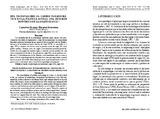Del nacionalismo al cambio paradigmático en la política actual. Una revisión histórica de la Arqueología
Fecha
2019-05-14Palabras Clave
Arqueología, Nacionalismo, Siglo XIX, Siglo XXArchaeology, Nationalism, 19th century, 20th century
Metadatos
Mostrar el registro completo del ítemResumen
La consolidación de la arqueología moderna como ciencia, está estrechamente vinculada al surgimiento y
auge del nacionalismo. La arqueología
funcionó como una herramienta que apoyó el discurso político de los Estados Nación y la identidad
nacional a finales del siglo XVIII; se consolidó en el
siglo XIX y continuó con fuerza hasta la primera mitad del siglo XX como
política pública. Durante estos tres siglos el nacionalismo presentó particularidades en cada región
del mundo según el contexto social y político de cada
época. A partir de la década de los ochenta del siglo XX, con las políticas neoliberales y el
debilitamiento de los Estados, el nacionalismo entró en crisis, y
junto a ello la arqueología oficial, reflejado en recortes presupuestales y menor
apoyo por parte del estado. Este trabajo presenta un panorama histórico de este
proceso así y reflexiones sobre el rol de la arqueología actualmente.
Colecciones
Información Adicional
| Otros Títulos | From Nationalism to paradigmatic change in current politics: A historical review of Archaeology |
| Correo Electrónico | mijaelycs@yahoo.com.mx |
| Editor | SaberULA |
| ISSN Electrónico | 2542-3304 |
| Resumen en otro Idioma | The consolidation of modern archeology as science is closely related to the rise and rise of nationalism. Archeology functioned as a tool that supported the political discourse of Nation-States and national identity at the end of the 18th century; It was consolidated in the 19th century and continued with force until the first half of the 20th century as public policy. During these three centuries, nationalism presented particularities in each region of the world according to the social and political context of each epoch. From the eighties of the twentieth century, neoliberal policies and the weakening of States, nationalism in crisis, and along with it the official archeology, the reflections in budget cuts and less support from the state. This work presents a historical overview of this process, as well as reflections on the role of archeology today. |
| Colación | 169-198 |
| Periodicidad | Semestral |
| Página Web | http://www.saber.ula.ve/boletin_antropologico/ |
| País | Venezuela |
| Institución | Universidad de Los Andes |
| Sección | Boletín Antropológico No.97: Artículos |






